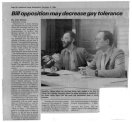1980
At the end of January, Backstreet closed its doors (January 31). A committee formed to try to re-open it, but that fell apart by March 15. The Holiday Inn on Brodie Street was a popular meeting spot for men.
On April 26-27, Robin Hardy, a grass-roots organizer for CGRO, was in Thunder Bay for meetings at a home at 404 Ambrose Street. On Saturday, a preliminary meeting was attended by some 30 people, followed by a party that night of some 60 people. On Sunday, an organizing meeting, attended by 15-20 people, formed Gays of Thunder Bay (GTB).
May 12 - first meeting with typed formal minutes (Doug Broman)
Over the next few months, meetings were held and money raised at house parties.
July 26 - Saturday - first benefit social for GTB at Ukrainian Labor Temple. Dances (socials) continued for years at this "usual Fort William location".
By September, office space was rented in the Zellers building on Red River Road, and a phoneline established.
November 18 - election of executive and approval of constitution with following objects.
The objects of GTB shall be:
a. To provide services and facilities, including a social club, to meet the social, cultural, psychological, educational and spiritual needs of the gay community:
b. To act as an information and referral source to members of the community and the community at large:
c. To strive for legal equality and for social acceptance of individuals of differing sexual orientations.
1981
In February, police raids on bathhouses in Toronto led to massive protests. The Right To Privacy Committee was formed to fight charges and worked to organize the gay community. GTB issued a media release condemning the raids.
Early warnings of the onset of what came to be known as AIDS came from New York and San Francisco.
June 12 - GTB sent a letter to Legislature committee supporting human rights bill
An attempt to amend the Ontario Human Rights Code to include sexual orientation was defeated.
Summer - participation with United Church members in dialogue on sexuality.
October - Thanksgiving - George Hislop (Toronto activist) in Thunder Bay - stayed at home on Ambrose Street.
1982
A new constitution was proclaimed in Canada, but equality-rights guarantees were not to come into force until 1985.
1983
Sat. Feb. 12 - Chris Collin's Odyssey (drag show) at Ukrainian Labor Temple
1985
The HIV antibody test was implemented in March in the US and November in Canada.
Fall 1985 - death in McKellar Hospital as a rsult of AIDS. Discussions took place about starting a committee to respond to AIDS, coming mainly from people in the gay and lesbian community. This has been recognized as the origin of the AIDS Committee of Thunder Bay (later AIDS Thunder Bay).
1986
The AIDS Committee of Thunder Bay (ACTB) had first formal meeting with minutes in January. A public forum on AIDS was held November 13, 1986.
The Ontario legislature began debating amendments (Bill 7) to the Ontario Human rights Code that would include sexual orientation.
In late November, homophobic editorials appeared in the Chronicle-Journal and Lakehead Living.
GTB held a media conference to respond, and to urge support for Bill 7. Click here for media coverage in Thunder Bay.
Bill 7 passed on December 16, making sexual orientation a prohibited ground for discrimination in Ontario.
1987
Twelfth Tradition, a gay AA was meeting on Thursdays and Sundays
Workshop for Lakehead Board of Education presented by Education Committee of GTB (Michael Sobota and David Belrose)
Thunder Gay Magazine, a weekly television program by and for the gay and lesbian community, began in the fall on McLean-Hunter Cable 7 television. It was produced and directed by Doug Broman. The show, one of the few in North America at the time, ran for four years until spring, 1991.
A volunteer orientation was held Sept.14, with introduction to production workshops Oct. 3, 10 and 17.
The Ontario Ministry of Health called for proposals for Community Based AIDS Organizations. ACTB incorporated and applied. Funding was granted in late fall. ACTB became a professional organization and Michael Sobota was hired as Executive director in December.
1988
Thunder Gay Magazine was denied use of the cruise ship Welcome, and a complaint was filed with the Ontario Human Rights Commission (OHRC).
1989
An OHRC settlement was reached in favour of Thunder Gay Magazine, and the cruise ship Welcome was offered to the group.







